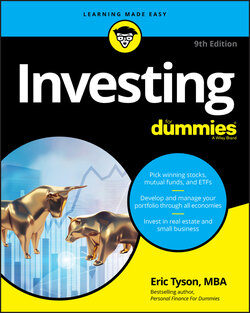Читать книгу Investing For Dummies - Eric Tyson - Страница 18
WHO WANTS TO INVEST LIKE A MILLIONAIRE?
ОглавлениеHaving a million dollars isn’t nearly as rare as it used to be. In fact, according to the Spectrem Group, a firm that conducts research on wealth, more than 11 million U.S. households now have at least $1 million in wealth (excluding the value of their primary home). More than 1.5 million households have $5 million or more in wealth.
Interestingly, households with wealth of at least $1 million rarely let financial advisors direct their investments. Only one of ten such households allows advisors to call the shots and make the moves, whereas 30 percent don’t use any advisors at all. The remaining 60 percent consult an advisor on an as-needed basis and then make their own moves.
As in past surveys, recent wealth surveys show that affluent investors achieved and built on their wealth with ownership investments, such as their own small businesses, real estate, and stocks.
If you try to invest in individual stocks, by contrast, you’re likely to work at it part time, competing against professionals who invest practically around the clock. Even if you devote almost all your time to managing your stock portfolio, you’re still a passive bystander in businesses run by others. When you invest in your own small business, you’re the boss, for better or worse.
For example, a decade ago, Calvin set out to develop a corporate publishing firm. Because he took the risk of starting his business and has been successful in slowly building it, today, in his 50s, he enjoys a net worth of more than $10 million and can retire if he wants. Even more important to many business owners — and the reason that financially successful entrepreneurs such as Calvin don’t call it quits after they’ve amassed a lot of cash — are the nonfinancial rewards of investing, including the challenge and fulfillment of operating a successful business.
Similarly, Sandra has worked on her own as an interior designer for more than two decades. She previously worked in fashion as a model, and then she worked as a retail store manager. Her first taste of interior design was redesigning rooms at a condominium project. “I knew when I did that first building and turned it into something wonderful and profitable that I loved doing this kind of work,” says Sandra. Today, Sandra’s firm specializes in the restoration of landmark hotels, and her work has been written up in numerous magazines. “The money is not of primary importance to me,” she says. “My work is driven by a passion … but obviously it has to be profitable.” Sandra has also experienced the fun and enjoyment of designing hotels in many parts of the United States and overseas.
Most small-business owners (myself included) know that the entrepreneurial life isn’t a smooth walk through the rose garden — it has its share of thorns. Emotionally and financially, entrepreneurship is sometimes a roller coaster. In addition to receiving financial rewards, however, small-business owners can enjoy seeing the impact of their work and knowing that it makes a difference. Combined, Calvin’s and Sandra’s firms created dozens of new jobs.
Not everyone needs to be sparked by the desire to start her own company to profit from small business. You can share in the economic rewards of the entrepreneurial world through buying an existing business or investing in someone else’s budding enterprise. I talk more about evaluating and buying a business in Part 4.
